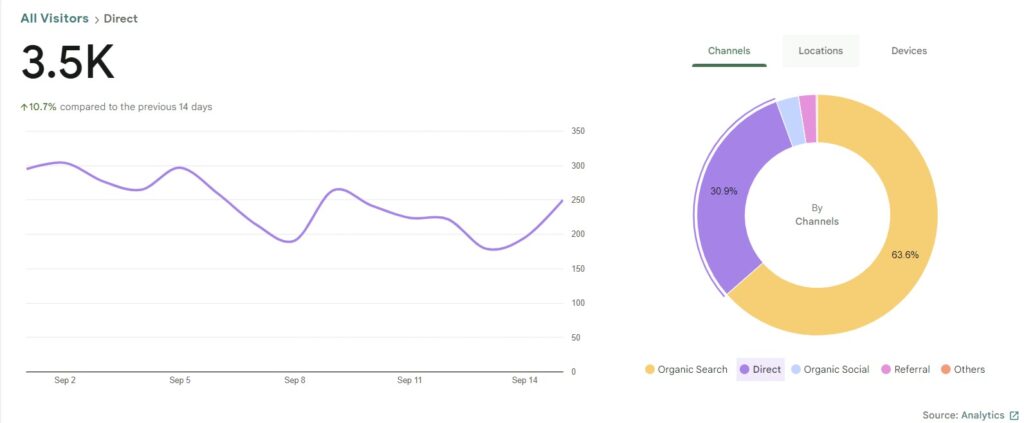SEO, or Search Engine Optimization, has come a long way since its inception. In today’s fast-paced digital world, staying on top of the ever-changing landscape of SEO strategies is crucial for businesses aiming to rank high on search engine results pages (SERPs) and drive organic traffic to their websites.
Read on and learn more about how SEO strategies are evolving and adapting to the changes and needs of the digital market.
Table of Contents
Understanding SEO: A Brief Overview
At its core, SEO is the practice of optimizing your website to improve its visibility on search engines like Google, Bing, and Yahoo. The goal? To rank higher in search results for relevant keywords, ultimately attracting more qualified traffic to your site.
SEO encompasses a wide range of strategies and tactics, from keyword research and on-page optimization to link building and technical SEO. Over the years, search engines have become increasingly sophisticated.
They are constantly updating their algorithms to deliver the most relevant and valuable results to users.

The Early Days: Keyword Stuffing and Metadata
In the early days of SEO, the name of the game was keyword stuffing. Website owners would cram as many keywords as possible into their content, often resulting in awkward and unreadable text.
Meanwhile, metadata—such as meta titles and descriptions—played a significant role in determining a page’s rank on SERPs.
However, as search engines grew smarter, they began penalizing websites that engaged in keyword stuffing and other black hat SEO tactics. This marked the beginning of a shift towards more user-focused and quality-driven SEO practices.
The Rise of Content Marketing in SEO Strategies
With the crackdown on keyword stuffing, content marketing emerged as a dominant force in the world of SEO. Instead of focusing solely on keywords, businesses started creating high-quality, informative, and engaging content that resonated with their target audience.
From blog posts and articles to videos and infographics, content became king in the realm of SEO. Not only did well-crafted content help improve a website’s search engine rankings, but it also established brands as authorities in their respective industries and fostered trust and credibility with their audience.
Mobile Optimization: A Must-Have
As smartphones became ubiquitous, mobile optimization became a critical aspect of SEO. With more and more users accessing the internet on their mobile devices, search engines began prioritizing mobile-friendly websites in their rankings.
Today, having a responsive website that looks and performs well on smartphones and tablets is essential for SEO success.
From responsive design to fast page load times, optimizing for mobile is no longer optional—it’s a necessity.
The Era of Voice Search for SEO Strategies
With the rise of virtual assistants like Siri, Alexa, and Google Assistant, voice search has emerged as a game-changer in the world of SEO. Instead of typing out their queries, users can now simply speak into their devices and receive spoken responses.
This shift towards voice search has significant implications for SEO. Unlike traditional text-based searches, voice queries tend to be more conversational and long-tail in nature.
As a result, businesses need to optimize their content for natural language and semantic search to better align with how users are searching via voice.
The Importance of User Experience
In recent years, user experience (UX) has become a key ranking factor in Google’s algorithm. Search engines prioritize websites that deliver a seamless and intuitive user experience, rewarding them with higher rankings on SERPs.
From intuitive navigation and fast load times to mobile responsiveness and engaging multimedia content, there are numerous factors that contribute to a positive user experience.
By prioritizing UX in their SEO efforts, businesses can not only improve their search engine rankings but also enhance the overall satisfaction of their website visitors.
The Role of Artificial Intelligence in SEO Strategies
Artificial intelligence (AI) is revolutionizing the field of SEO in more ways than one. Machine learning algorithms are helping search engines better understand user intent and deliver more personalized search results.
From Google’s RankBrain algorithm to natural language processing (NLP) models like BERT, AI is powering advancements in semantic search and natural language understanding.
As a result, businesses need to adapt their SEO strategies to account for these AI-driven changes and focus on creating content that meets the evolving needs of users.
The Rise of Local SEO
In an increasingly competitive online marketplace, local SEO has become a powerful tool for businesses looking to connect with customers in their area. With the proliferation of smartphones and location-based services, more and more users are turning to search engines to find local businesses, products, and services.
Optimizing your website for local search involves several key strategies, including creating and optimizing Google My Business listings, obtaining local citations from authoritative directories, and optimizing on-page content with locally relevant keywords.
By focusing on local SEO, businesses can increase their visibility in local search results, attract nearby customers, and drive foot traffic to their physical locations.
The Impact of Social Media on SEO
While social media and SEO are often viewed as separate marketing channels, the two are closely intertwined. Social signals—such as likes, shares, and comments—can have a significant impact on a website’s search engine rankings.
By actively engaging with their audience on social media platforms like Facebook, Twitter, and Instagram, businesses can increase brand awareness. They can also drive traffic to their website, and earn valuable backlinks from authoritative sources.
Additionally, social media profiles often rank highly in search engine results. Therefore, providing businesses with another opportunity to control their online presence and enhance their visibility in search.
The Role of Technical SEO Strategies
While content and keywords often steal the spotlight, technical SEO plays a crucial behind-the-scenes role in determining a website’s search engine rankings. Technical SEO involves optimizing various technical aspects of a website to improve its crawlability, indexability, and overall performance.
Key areas of technical SEO include optimizing website speed and performance, fixing crawl errors and broken links, implementing structured data markup, and ensuring proper site architecture and navigation.
By addressing technical issues and improving the overall health of their website, businesses can create a solid foundation for their SEO efforts. These will help them improve their chances of ranking higher in search engine results.
The Power of Analytics and Data-driven Insights
In the world of SEO, knowledge is power. By leveraging analytics and data-driven insights, businesses can gain a deeper understanding of their audience, track the performance of their SEO efforts, and identify opportunities for improvement.

Tools like Google Analytics and Google Search Console provide valuable data on website traffic, user behavior, keyword performance, and more. By analyzing this data, businesses can identify which keywords are driving the most traffic to their site.
Not only that but which pages are performing well, and where there may be room for optimization.
Armed with this information, businesses can make informed decisions about their SEO strategy. Then they can allocate resources more effectively, and ultimately achieve better results in the ever-evolving world of search engine optimization.
The Future of SEO: Adaptation and Innovation
As we look to the future, one thing is clear: SEO will continue to evolve at a rapid pace. From algorithm updates to emerging technologies, staying ahead of the curve will be crucial for businesses to have a competitive edge.
By embracing change, staying informed about the latest trends and best practices. By focusing on delivering exceptional value to users, businesses can navigate the ever-changing world of SEO with confidence. It will help to achieve long-term success in the digital marketplace.
What are you doing today to prepare for the future of SEO? Please drop a comment below so we can discuss it.
- BlueSky vs Twitter (X): Similarities & Shared Features Explained - February 26, 2026
- How To Join X (Twitter) Chats And Inspire Others Along The Chat - February 26, 2026
- Mobile App Tracking Tools: Track Your Kids & Money Like a Pro - February 24, 2026




Great points. I have been a family lifestyle blogger for 14 years and everything evolves but I agree that SEO strategy is changing at a particularly fast rate. I also agree that making sure you have the best, most useful content is key to staying on top.
Hi Scarlet, welcome to Inspire To Thrive. It really is evolving at an extremely fast pace! I was offline most of the day and saw already new things that happened today. I’m glad you agree on the useful content. Have a great day and thanks for coming by on this one.